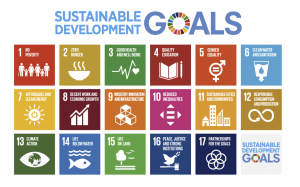At King’s, we are not only concerned about improving environmental sustainability, but also about the wider social and economic impacts the university has. That is where the United Nations’ Sustainable Development Goals (SDGs) come in: they guide our work and help us measure our progress holistically.
Adopted in 2015 as part of the wider UN Agenda for Sustainable Development, the SDGs outline the global targets for development by 2030. There are a total of 17 goals that have been agreed upon by all UN member states, cutting across social, economic and ecological concerns.
An ambitious and wide-reaching agenda
While the large number of goals (and sub-targets) has been criticised, the strength of the SDGs lies in their recognition of the interconnectedness of the many challenges we face today and the need for system-wide change. Indeed, “they recognise that ending poverty and other deprivations must go hand-in-hand with strategies that improve health and education, reduce inequality, and spur economic growth – all while tackling climate change and working to preserve our oceans and forests” (UN, 2021).
To learn more about the SDGs, head over to the UN SDGs webpages and check out the following blog posts written by PhD student Onna Malou van den Broek:
- SDG 1: The Battle Against Poverty;
- SDG 2: Food is Life;
- SDG 3: Healthcare as a Human Right;
- SDG 4: Education as the Passport to the Future;
- SDG 5: Gender equality – “I am a Nasty Woman!”;
- SDG 6: Water – The glass is half empty and half polluted;
- SDG 7: Energy – A Social and Environmental Challenge;
- SDG 8: Economic Growth or Degrowth?;
- SDG 9: Progress for better or worse?.
Goals, targets and indicators
Each of the 17 SDGs is broken down into targets (there are 169 in total) alongside indicators (232 overall) to facilitate the measurement and evaluation of progress on the goals.
For example, SDG 5 “Achieve gender equality and empower all women and girls” is broken down into 9 targets, including “Ensure women’s full and effective participation and equal opportunities for leadership at all levels of decision-making in political, economic and public life”. The indicators to measure our achievement of this target are the proportion of seats held by women in national and local governments, as well as in managerial positions.
The SDGs at King’s
As mentioned at the beginning of this post, we use the SDGs as a way to both guide our work and measure our progress. And this commitment extends beyond the Sustainability Team – King’s recognises that as an educator, we have a responsibility to play a central role in advancing the SDGs. This is captured in the King’s Strategic Vision 2029 “to make the world a better place”, and in our commitment to act “in service to society” .
- Our yearly Environmental Sustainability Reports link our targets and progress to the SDGs.
- Each year, we take part in the Times Higher Education Impact Ranking, which ranks universities for their contribution to the SDGs. King’s ranked 11th in the world in 2021 in recognition of the university’s positive social and environmental impact. This year, in addition to our commitment to climate action, promoting global health and supporting strong institutions and promoting peace and justice, we were highly ranked for our work with local, national and international partners – leading on to the next point.
- Given the opportunity sustainability gives us to envision and build a better world for all, we want to ensure our work truly engages the King’s community:
- We held several Hackathon events, giving an opportunity for students and staff to feedback directly on several challenges we face within sustainability. Building on these sessions, we are currently running our Listening Campaign which seeks to ensure our future sustainability projects are co-created with students and staff.
- The King’s Climate Action Network (CAN) was set up last year with the aim to bring together individuals from across the King’s community to co-create and implement King’s climate action plan (set to be released in October 2021). Within the King’s CAN, one working group focuses specifically on Students and Education, discussing how to embed climate into education at King’s.
- Our Sustainability Champions programme has continued to grow, with 58 teams receiving awards this year. This programme brings together staff from across our campuses, who all play a crucial role in making King’s a more sustainable place.
What do you think – is the wide reach of the SDGs mostly a strength or a weakness?


